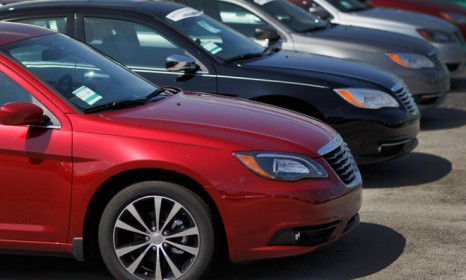The auto industry's 'surprisingly' good September: 6 theories
GM, Chrysler, and Ford all enjoy a spike in vehicle sales. What caused it?

A free daily email with the biggest news stories of the day – and the best features from TheWeek.com
You are now subscribed
Your newsletter sign-up was successful
Despite fears of a double-dip recession and sputtering consumer confidence, U.S. car and truck sales were actually up in September, "surprising the auto industry and raising hopes that a bumpy year will end on a high note." General Motors reported a 20 percent sales jump from September 2010 to September 2011, while Chrysler's sales were up a whopping 27 percent — the company's best September since 2007. Ford also saw a 9 percent uptick, and U.S. vehicle sales were up 10 percent overall from last September. To what do we owe this rare bit of economic good news? Here, six theories:
1. Americans are replacing their aging vehicles
Many consumers have delayed purchasing new cars due to the recession and poor economy, but they're getting to a point where they can't wait any longer, says Jerry Hirsch in the Los Angeles Times. Industry estimates say the average age of cars on the road is 11 years. "We have pent-up demand. Consumers want to replace the cars," says Moody's analyst Scott Hoyt. "If we get just a little better job growth a number like this could be sustainable." Businesses are also have to replace aging fleets of trucks. "A commercial owner cannot afford to have their vehicle out of service," says GM's vice president of U.S. sales, Don Johnson.
The Week
Escape your echo chamber. Get the facts behind the news, plus analysis from multiple perspectives.

Sign up for The Week's Free Newsletters
From our morning news briefing to a weekly Good News Newsletter, get the best of The Week delivered directly to your inbox.
From our morning news briefing to a weekly Good News Newsletter, get the best of The Week delivered directly to your inbox.
2. We're getting used to the bad economy
"Consumers are learning to live with economic uncertainty" and buying cars despite their money worries, says Bree Fowler for the Associated Press. Indeed, "we see consumers being more comfortable with buying cars in a continuously volatile environment," says Jesse Toprak of TrueCar.com. "Traditionally, they would have postponed making the purchase decision."
3. Hurricane Irene delayed purchases
Hurricane Irene may have been a killer storm, but there's at least one upside: With people up and down the east coast stuck indoors, the storm "pushed some [car] sales from August into September," say Dee-Ann Durbin and Tom Krisher for the Associated Press.
A free daily email with the biggest news stories of the day – and the best features from TheWeek.com
4. Automakers offered great deals
"Auto analysts also suggested more generous purchase discounts and low-rate financing helped boost sales," says Sharon Terlep and Mike Ramsey in The Wall Street Journal. "Industrywide, incentives were up 3.9%, to $2,716 from $2,615, compared to August, according to auto research firm Truecar.com."
5. Used cars are getting pricey
"Record used car prices may make this a great time to buy new," says Eric Evarts at Consumer Reports. New cars sales sputtered in 2008 "during the depths of the recession," and now, as a result, used cars are in short supply. That means higher trade-in values for drivers looking to ditch their old cars and get something new.
6. Japan's March quake is still hurting Toyota's production
"A shortage of [Japanese] cars is another reason [American] truck and SUV sales were strong," says Fowler. The March earthquake and tsunami left Japanese automakers struggling to produce enough inventory. While "analysts had expected more Japanese cars to fill showrooms after months of shortages related to March's earthquake and tsunami," Toyota and Honda are still struggling to produce enough cars.
-
 The environmental cost of GLP-1s
The environmental cost of GLP-1sThe explainer Producing the drugs is a dirty process
-
 Greenland’s capital becomes ground zero for the country’s diplomatic straits
Greenland’s capital becomes ground zero for the country’s diplomatic straitsIN THE SPOTLIGHT A flurry of new consular activity in Nuuk shows how important Greenland has become to Europeans’ anxiety about American imperialism
-
 ‘This is something that happens all too often’
‘This is something that happens all too often’Instant Opinion Opinion, comment and editorials of the day